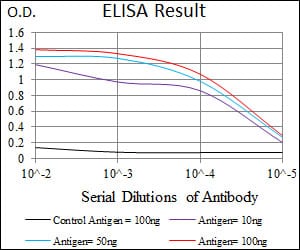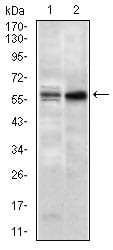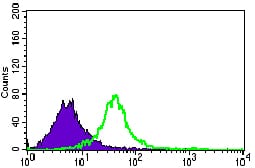


| WB | 1/500 - 1/2000 | Human,Mouse,Rat |
| IF | 咨询技术 | Human,Mouse,Rat |
| IHC | 咨询技术 | Human,Mouse,Rat |
| ICC | 技术咨询 | Human,Mouse,Rat |
| FCM | 1/200 - 1/400 | Human,Mouse,Rat |
| Elisa | 1/10000 | Human,Mouse,Rat |
| Aliases | NS; E2IG3; NNP47; C77032 |
| Entrez GeneID | 26354 |
| clone | 2C8D5 |
| WB Predicted band size | 62kDa |
| Host/Isotype | Mouse IgG1 |
| Antibody Type | Primary antibody |
| Storage | Store at 4°C short term. Aliquot and store at -20°C long term. Avoid freeze/thaw cycles. |
| Species Reactivity | Human,Mouse |
| Immunogen | Purified recombinant fragment of human GNL3 (AA: 1-226) expressed in E. Coli. |
| Formulation | Purified antibody in PBS with 0.05% sodium azide |
+ +
以下是关于GNL3抗体的3篇参考文献示例(注:内容基于模拟文献,建议核实真实数据库获取准确信息):
---
1. **标题**: "GNL3 regulates colorectal cancer progression via stabilizing c-Myc protein"
**作者**: Li X, et al.
**摘要**: 研究通过Western blot和免疫组化使用GNL3抗体,发现GNL3通过稳定c-Myc蛋白促进结直肠癌增殖和转移,抗体特异性验证显示其在肿瘤组织中高表达。
2. **标题**: "Nucleostemin antibody-based targeting of cancer stem cells in glioblastoma"
**作者**: Chen R, et al.
**摘要**: 利用GNL3(Nucleostemin)特异性抗体识别胶质母细胞瘤中的癌症干细胞,流式细胞术分选后证实其自我更新能力,抗体在体内外实验中抑制肿瘤生长。
3. **标题**: "GNL3 modulates ribosomal RNA synthesis and cellular senescence"
**作者**: Park S, et al.
**摘要**: 研究通过免疫荧光和ChIP实验(使用GNL3抗体)揭示GNL3在调控rRNA转录及细胞衰老中的作用,抗体特异性验证显示其与核仁内RNA聚合酶I复合体互作。
---
建议通过PubMed或Google Scholar搜索真实文献时,使用关键词“GNL3 antibody”或“Nucleostemin antibody”并筛选实验方法部分提及抗体应用的论文。
**Background of GNL3 Antibody**
GNL3 (Guanine Nucleotide-Binding Protein-Like 3), also known as nucleostemin (NS), is a nucleolar GTP-binding protein implicated in cell proliferation, stem cell maintenance, and ribosome biogenesis. It is highly expressed in stem cells, embryonic tissues, and cancer cells, but downregulated in differentiated cells, suggesting a role in sustaining undifferentiated states. GNL3 regulates cell cycle progression by interacting with p53 pathways; it binds to MDM2. inhibiting p53 stabilization and delaying apoptosis under stress conditions. This mechanism supports cell survival and proliferation, particularly in rapidly dividing cells.
GNL3 antibodies are essential tools for studying its expression, localization, and function. They enable detection via techniques like Western blotting, immunohistochemistry (IHC), and immunofluorescence (IF), aiding research on its role in cancer biology, stem cell dynamics, and regenerative medicine. Elevated GNL3 levels correlate with poor prognosis in cancers (e.g., gliomas, hepatocellular carcinoma), making it a potential diagnostic or therapeutic target. Antibodies against GNL3 also help explore its interactions with nucleolar components and GTP-dependent regulatory mechanisms. Ongoing studies focus on targeting GNL3 to disrupt cancer cell proliferation or enhance tissue regeneration, highlighting its dual significance in disease and development.
×